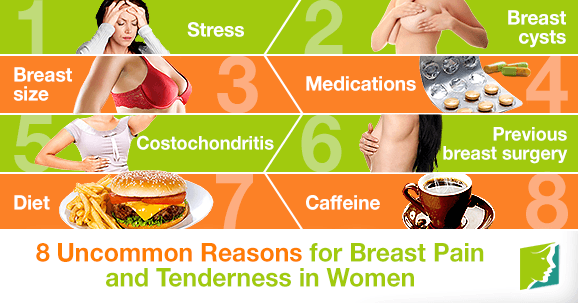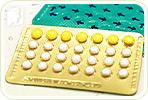Breast pain and tenderness is one of the most common complaints reported by women. Breast pain is defined as the general discomfort and soreness in one or both breasts. There are two types of breast pain, cyclical and non-cyclical. Cyclical is mainly caused by hormone fluctuations. Non-cyclical is caused by things like cysts or stress. The leading cause of breast pain during menopause is hormone fluctuations. While it is helpful to know the common causes of breast pain, it is good to know the uncommon reasons as well.
Stress
Stress is a leading cause of breast pain and tenderness. Managing stress is essential for both physical and mental health. Practicing yoga, meditation, reading, and listening to soothing music are all helpful stress relievers.
Breast Cysts
Cysts are fluid-filled sacs that can develop in the breasts are usually benign, but they can cause pain and tenderness. That being said, it is still recommended to see a doctor to be sure that the cyst is harmless.
Breast Size
Women of all breast sizes experience breast pain; however, women with larger breasts are more susceptible to pain. It is highly recommended to wear a properly fitted bra during any kind of activity in order to provide optimal support and comfort.
Medications
Breast pain and tenderness is a common side effect of certain medications like oral contraceptives, antidepressants, and cholesterol and heart medication. It is important to be aware of the side effects of your medication before taking them.
Costochondritis
This non-cyclical cause of breast pain is the inflammation of the ribs' junctions to the breastbone or sternum. Costochondritis typically affects older women and can be a result of years of bad posture.
Previous Breast Surgery
Incisions from previous surgery that have not properly healed may become irritated and cause pain. However, breast pain associated with breast surgery can sometimes linger after incisions have healed.
Diet
Women who eat excessive amounts of salty foods and saturated fats are more susceptible to experiencing breast pain than those with healthy diets. It is important to include fruits and vegetables, protein, complex carbohydrates, and good fats in your daily diet. Avocados, kale, and low-fat yogurt are all nutrient-rich foods that have been shown to help lessen breast pain.
Caffeine
Caffeine causes blood vessels to dilate, which can lead to breast pain and tenderness. Try to avoid tea, coffee, and sodas in order to prevent breast pain.
Breast pain and tenderness affects around 70% of women on average at some point in their lives. Hormone fluctuations are the main cause of breast pain and tenderness in women, which usually occurs during menstruation, pregnancy, and menopause. It is important to know that breast pain is rarely a sign of breast cancer, but it is also crucial to get regular breast exams just to be sure. If breast pain and tenderness persists or worsens after several days, you should contact a doctor.
Sources
- Mayo Clinic Staff. (2013). Breast pain - Causes. Retrieved October 30, 2014, from http://www.mayoclinic.org/diseases-conditions/breast-pain/basics/causes/con-20025541
- National Health Service UK. (2014). Breast pain Retrieved October 30, 2014, from http://www.nhs.uk/conditions/breastpaincyclical/pages/introduction.aspx
- National Institute on Aging. (2012). Hormones and Menopause. Retrieved October 30, 2014, from http://www.nia.nih.gov/health/publication/hormones-and-menopause
- University of Maryland Medical Center. (2014). Breast pain. Retrieved October 30, 2014, from http://umm.edu/health/medical/ency/articles/breast-pain



